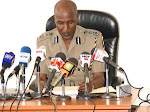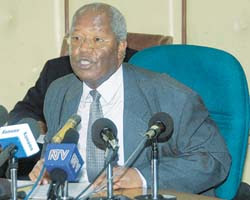From the interview, it emerged that some of mungiki's followers are the educated middle-class who contribute a whooping KShs 2 billion a year to sustain the gang. Consequences for defaulting are scary, the gang says.
Asked whether they kill people, Mathenge retorted, "True we have been killing people but you have to understand us, even God in the Old Testament killed people who did not toe the line of the Law. We have been killing defectors, and those who refuse to pay their dues for our services and that will not stop".
Asked how many mungiki members are in Kenya and abroad, "We had our last National Convention in April 2007 in Thogoto and we realized we had recruited 45,000 new members we are now about 2.8 million, of course excluding Women and Children".

The group is currently led by one Joe Waiganjo (General) and draws membership from some of the politicians in parliament.
Meanwhile, a plan by the outlawed Mungiki, a sect which is slowly transforming into an Italian like Mafia, was to blame for most of the crimes committed in early 2007 in the East African nation, a confidential twenty-four page police report indicates. The report details a shocking blow-blow account of a Mungiki that is not only running real estate and transport businesses but one that is now boasting of making a number of poor people instant millionaires and one that was preparing to sponsor a number of candidates to parliament in last year’s general elections – which they did.
The report says that the crime wave that had hit the country at the time the report was compiled under the spotlight was directly funded by the Mungiki and is intentionally aimed at the rich and prominent in the society and police officers.The report even lists recently fallen Kenya’s most wanted Criminal Simon Matheri Ikeere as one of the prominent members of the dreaded cult. “Out of the 26 criminals whose photo’s police have circulated over the last six months, 18 belong to the Mungiki,” the report says.
So organized is the Mungiki, that the report approximates the net worth of the outlawed religious sect at Shs. 4.5 billion as at January 15 this year. Interestingly, the report says the Mungiki are currently preparing to have its first budget in May this year – a month before the National budget usually presented by Finance Ministers in parliament.Just like any other serious Mafia organization, the Mungiki runs six armouries – five less than what the state runs, across the country. The headquarters, the report says, is in Laikipia and that’s where all the sources of weapons direct their donations.
“The Mungiki Laikipia armory is large and runs about 15 feet deep, those who steal guns from the police are rewarded with ranks within the organization and are branded heroes,” the report reveals.Other armouries are in Dandora, Tigoni area, Kayole, Njiru and Kitengela. “Each armoury exists for a reason; the Tigoni one is a back-up for highway crime, while Kayole and Njiru exist so as to offer refuge to gangsters and those commanding the transport sector.”“The Kitengela armoury is the main source of weapons and manpower to spread fear and panic, basically it is meant to organize and dispatch assignments,” the report reads.
The sources of weapons for the organization has been directly linked to the beef business where guns are wrapped together with the meat as it makes its way from North-Eastern to the country, other sources include th Oromo Liberation Front in Ethiopia and North Uganda.
In the armouries, the main weapons available are AK 47’s with a cache of bullets and G3 rifles.“The ultimate goal,” reads the report stamped highly confidential, “is to make sure that both the Police Commissioner and the Minister for Internal Security are sacked.
“The attack on foreigners is so as to affect the booming tourism industry and to increase the pressure of the sackings from abroad countries housed in Kenya, attacks on the rich and the prominent is a strategy to unify Kenyans around the same cause, while that strategy of killing police officers is meant to scare the law enforcers, and those are all characteristics of a Mafia Organization,” the report chillingly reads on.
“They have established a clear broad network and with the laws on money laundering still very weak they are able to access lots of money through charity like events and others directly from Kenyans with a die hard association with the group, a channel that cannot be stopped, because they educate hundreds of children and even run three credible children’s home,” the report says.
Mungiki, the report further reveals has already adopted a flag that’s coloured white, yellow, green, red and black – hues associated with the sect.
Links are also being drawn to an international organization the Universal Miracle Centre, little information about the mother body were forthcoming by the time of going to press. “The resurgence of the sect comes after a failed attempt to revive under the guise of the National Youth Alliance Party,” the report further reads.
Young unemployed people are lured into Mungiki through practical pledges of employment and life changing fortune making assignments, “graduates pass through a rite that involves ingesting human urine and umbilical cords, before undergoing a public baptism, where English (or Christian) names are dropped in favour of authentic names”.
Elaborate Ritual
The report further details how conversion to Mungiki happens, “Initially held at their shrine in Karandi area of Laikipia District, the oathing ceremony is an elaborate process, which begins late in the evening, goes on through the night to end at dawn.
”Black sheep and goats are slaughtered and their blood mixed with some mixture said to be made out of wild plant roots. Other independent sources explained to our reporters that, “Traditional Kikuyu beer, Muratina, whose main component is honey is served in plenty as the initiates engage in singing and chanting slogan in praise of their gods and the movement.”
Paraphernalia, which include walking sticks painted in red, green, black and white, gourds and small tobacco containers are passed around to members and a flag in the same colours is normally hosted outside the shrine. "We are Mungiki and we shall stick together and guard the secrets of our sect. We shall protect one another and remain united under our leaders…" the initiates chant as they sip a bloody concoction that is passed around to everyone present. They also sing traditional songs.
“Roast meat is also passed around to members who take bites in turns after their leaders, and tobacco, in small containers, is passed around for members to sniff,” says a former member who requested anonymity.
The man, who co-ordinated Mungiki activities in Rift Valley since the sect was founded until it was declared illegal, says the aim of the elaborate ritual is to unify the group. "All we wanted to achieve was strong unity and to be identified by the society," he says. The sole purpose of the oath, he says, is to ensure that the initiates abide to our doctrines of coming together to form a society that respects the Kikuyu culture and the ancient practices.
As morning comes, the new initiates are "baptised" in the wee hours of the morning at a dam near the shrine. The then sect spiritual leader Maina Njenga conducted the ceremonies. The converts are immersed in the murky waters before passing over a goatskin, which is spread on the ground where the spiritual leader stood. The sad thing about those who joined the sect after being coerced was that there was no turning back after the oath, our source revealed.
"Anyone who joined the sect would be allowed to know all the secrets including our sources of funds our operations and other internal matters. That is why some people were killed once they denounced the sect," he reveals. There is no turning back once you are a true Mungiki, he says, adding that no one has ever performed a reversal ritual.
"This explains why those who join us disappear from the public domain once they feel like not continuing to be members," he explains.
 Christian convert and PNU politician Ndura Waruinge and imprisoned mungiki chief Maina Njenga have not "properly deserted mungiki", we can now report. A leader of the gang in Central Nairobi, a Mathenge (Mnyama) was asked by a reporter why his dreaded gang had not beheaded the duo. His answer was curt, "They are alive because we know they have not moved, there are clear structures on how resignations of top leaders are handled, look they were once Muslims remember that conversion? Now they are Christians, maybe tomorrow they will be Hindu but the bottom line is that they are still part of us".
Christian convert and PNU politician Ndura Waruinge and imprisoned mungiki chief Maina Njenga have not "properly deserted mungiki", we can now report. A leader of the gang in Central Nairobi, a Mathenge (Mnyama) was asked by a reporter why his dreaded gang had not beheaded the duo. His answer was curt, "They are alive because we know they have not moved, there are clear structures on how resignations of top leaders are handled, look they were once Muslims remember that conversion? Now they are Christians, maybe tomorrow they will be Hindu but the bottom line is that they are still part of us". The group is currently led by one Joe Waiganjo (General) and draws membership from some of the politicians in parliament.
The group is currently led by one Joe Waiganjo (General) and draws membership from some of the politicians in parliament.














|